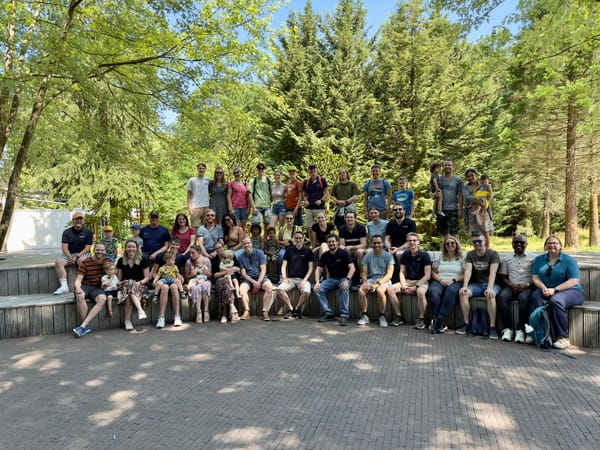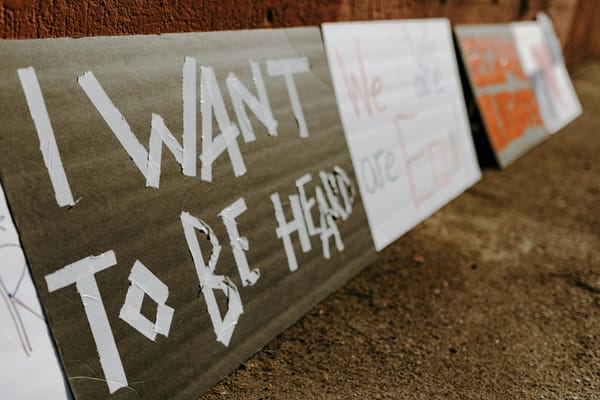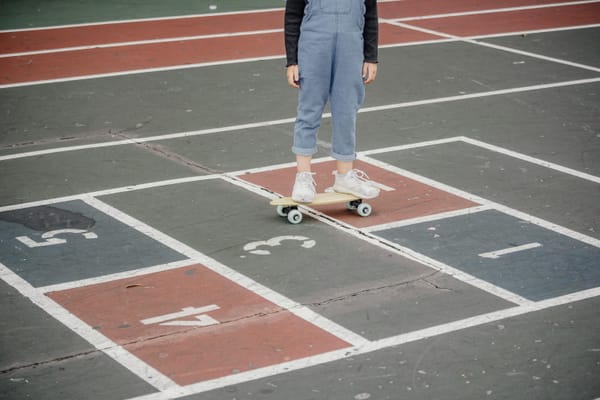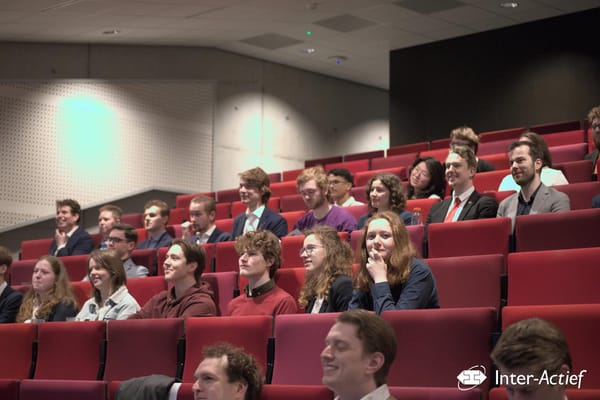A Day With the Dean of EEMCS - Interview With Boudewijn Haverkort
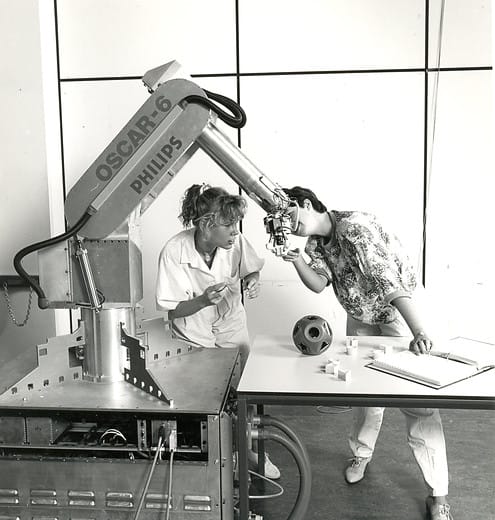
From October 1st, the Faculty of Electrical Engineering, Mathematics and Computer Science has a new dean: Boudewijn Haverkort. Although he has worked hard as a Dean at Tilburg University, Haverkort is not new to our faculty. He has been active at the Department of Computer Science for many years before leaving in 2018 for a position at Tilburg University.
Introduction
My name is Boudewijn Haverkort, I’m the new dean of the faculty for Electrical Engineering, Mathematics and Computer Science. I’m a computer scientist by training and I have worked at various universities in the Netherlands and also in Germany. I’m married and I’m a father to a daughter and a son. Both of which are former students, one of this university and one of a music arts school.
I studied Computer Science here in Twente starting in 1982, the second year of the study programme of Computer Science. I belonged to the second generation. The first generation had 17 students or so, and the second had 175. At that time there was no separation between the bachelors and masters. You just had the engineering degree and subsequently, I received my PhD here as well in 1991.
If you look at my LinkedIn, you’ll see that I am fascinated by technology, but inspired by the arts. So I’m really interested in art, especially modern art, literature, modern music and I’m an active sportsman. I run, swim and cycle, so I do mini triathlons. And I like a lot of walking, just the great outdoors with my dog or with my family.
I have a very broad interest. If you would look at my publications, you’ll see that I’ve done things related to electrical engineering and computer and communication system design, but I have also worked on data science and decision support, things that mathematicians do. What interests me most is actually the fact that we as faculty are working on systems (hardware and software) that really make a difference in the outside world. The systems that we work on really have changed the way cars are being driven, manufactured and shipped, administrative processes, etc. That’s what interests me most. It’s the impact that we make with computer equipment, programming hardware, decision support, AI and so on.
Responsibilities of a Dean
In essence, the dean is the chairman of the board of the faculty. The board consists of four people. The vice dean of education is responsible for the educational programmes. The vice dean for research is responsible for the research and there is also the managing director for the operational tasks. The job of the dean is to bring all these branches together. I’m involved in all of these things, and in the end, my voice is important in the decision-making.
What I am trying to do is to bring a certain spirit to the faculty about how we approach things. To me, that means, for instance, that I’m very focused on collaboration within the faculty, but also with the other faculties and with the outside world. I think we should be inspired by real world challenges such as climate change, healthcare and poverty. We can use the technologies available in our faculty, in order to help approach these challenges.
A dean needs to be good at listening, being quiet, balanced, and they must know when to make the exception. They should try to bring peace and quietness within the faculty. There are a lot of things happening around us and within the university. It’s important to be aware of that, but it’s also important to keep the final goal that you have in mind and not be distracted too easily. You need to focus on the long term goal and for the faculty that is educating the next generation of students such that they learn the things that bring them further in society and in such a way that they contribute to society.
Current and Future Goals
For the current academic year I’m working on continuing to do the things that we are already doing well. That is an important point but that is only until the summer. I also want to have conversations within the faculty about other things that we can do and also be a little critical to ourselves. What are we doing within the faculty and certain study programmes? Are they still fit for purpose? Are there other opportunities for new study programmes? Are there opportunities for our programmes, or in connection with other faculties?
You’ll probably know that the university has selected a number of impact domains, climate, chip technology, health and safety & security. We, the board, want to make it clearer what everyone is doing in relation to these impact domains. In the end, I think it’s good that in the course of next year we have a stronger pronounced vision of where we want to head to with our faculty.
It is also incredibly important to look further into the future. If you stop innovating, you sort of become less relevant. We do a lot of things, topic-wise, very well, but I think adding a little bit of this energy towards innovation of ourselves and our organisation is what is needed in order to remain relevant as a faculty and as a university. So I have that ambition for our faculty, but also for the university as a whole. Our university, like most universities in the Netherlands, has to look carefully at how we’ve been working, and what our priorities should be, since budget cuts are threatening. So we have to know better than we know now explicitly where we want to head to.
Collaboration with Study Associations
I do know all the study associations by name. I actually visited the building where some of the study associations are housed, and I walked in there during a lunch break and I had a chat with someone I don’t recall their name. They said: “Well, it’s great that you’re here, we do not often see a dean over here.” I think study associations are very important because they bring comfort to students. They form a home for students, a mixed student population, so that is very important. What I did in Tilburg, I had at least once or twice a year a conversation over lunch with the chairpersons of the study associations to hear how they were doing, what they would need, or how we could help or how they could collaborate. That is something that I think I will do here as well.
During my own studies, I was a member of Inter-Actief and I was one of the founders of the alumni association ENIAC. I also guided one the first Japan trip of Inter-Actief in the early 1990s and that was a great experience, so I have good memories of my own study association. They play an important role.
Differences between Enschede and Tilburg
My current position here compared to the one in Tilburg is similar. There were six deans in my old university; here there are only five. The school (an equivalent term for a faculty at Tilburg University, red.) was a little bit smaller in staff but bigger in terms of student numbers. The topics were different as well. It’s much more technical here, in Tilburg it was much more society oriented, although with a firm connection to data science and AI, the technical part came in, therefore it’s relatively comparable. However I think the organisations do differ. The way things are organised with procedures, cooperation procedures, and the processes were different. And that requires some adaptation from my side, or from the side of the procedures, we’ll see.
The work that I do here, however, does not differ that much to what I did in Tilburg. When I went to Tilburg, I thought it would be really challenging to deal with the philosophers in the philosophy department or with the scientists in the culture studies department, but that turned out to be not so challenging at all. Of course you have challenges, but what are these people doing? They are doing great scientific stuff and they want to teach, but their real concern is, how do we get enough students? Where is the funding for the research? How do we connect to the outside world? Can we have partners in the outside world?, and so on. And that is similar here for computer scientists or for electrical engineers or biomedical engineers regardless.
So the problems are similar within the faculty, though there is a difference in how problems are approached. There is a difference, very, very broadly speaking, between social scientists and engineers. At this university we have more of the engineering mentality, which is intrinsically more constructive. Most of the people here want to build something when they have a problem. They see a problem, it can be technical or in the outside world, and then they start thinking about a solution. Social scientists have a different approach, and this was reflected in the motto of Tilburg University: “Understanding Society”. The goal is to analyse what is going on and try to understand it and to explain it. There is not so much emphasis on the constructive part of solving a problem.
What I like a lot here in Enschede is the campus and this constructive or entrepreneurial spirit. It’s also something that you see a lot. There is this building across the street where all the student teams are. If you walk in there, there is so much energy and so much ambition and that is just great, it really makes me happy.
Accomplishments in Tilburg
In Tilburg, we managed to build connections between the very different departments. There were six departments in the school on really, very different topics such as, philosophy, culture studies, AI and data science and communication and information studies. We established connections by providing seed grants for research cooperations across boundaries.
I’m also very proud of the student number increase. We went from 2000 to 3000 students in a couple of years. That is, of course, not just my contribution, but it happened and we accommodated it, we did grow a lot.
As part of the strategy of the university, I also worked on two large projects, one was called ENGAGE. It’s a European university alliance similar to ECIU. We made a European wide virtual campus between nine universities across Europe, with European funding, so that students of these universities all have the opportunity to have a European experience, be it by visiting another university or by doing an international class or course, together with students from the other universities, so-called virtual mobility. The other project was that I established a new strategic programme called Digital Sciences for Society in which scientists from across the universities could collaborate on “digital topics,” such as data science or AI, in connection with their topic of origin, for instance, law or behavioural sciences. I think that this programme really gave a boost to digitalisation and use of AI within the university as a whole.
Advice to Students
If I could go back to my own university days I think I would be a more active student now. I was an okay student, very active in my student dorm, and was very active in sports, but I was less involved in organisational stuff related to the study and study association. For example, I was never a member of the Faculty Council, which I was later as a staff member. If I could go back I would be more active in that part as well. My advice to the students is to grasp the opportunities.

